Browse Insulating Curtains & Blinds
Insulating Curtains & Blinds
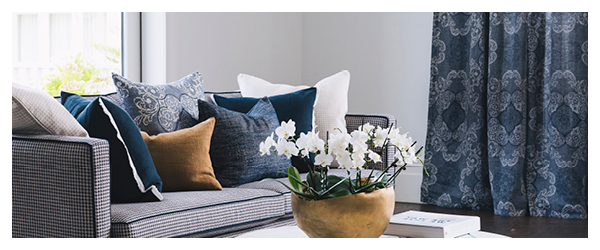
For A Warm & Healthy Home
Each month New Zealanders are faced with a stack of bills they have to pay to keep their household running, and as winter arrives, the dreaded electricity bill can often cause our household costs to skyrocket. In the common New Zealand household, over one third of the energy bill is attributed to keeping our homes warm. However, according to New Zealand’s Energy Efficiency and Conservation Authority (EECA), over 600,000 New Zealand homes have inadequate insulation, resulting in all of this heat being lost through our roofs, walls and windows.
![]()
Heat Loss Through Windows
As shown below, windows are the Achilles’ heel in many New Zealand homes. BRANZ, an independent research, testing, consulting company for the Building Industry, released a report recently outlining where heat is lost in the home. According to BRANZ, 42% to 45% of heat, in houses insulated to Pre-2007 requirements, is lost through windows. Even if your home has been insulated under the 2007 Building Code, in which double glazing is a requirement, 21% to 31% of heat is still lost through windows. In addition, the better your ceiling, walls and floors are insulated, the higher the heat loss will be through your windows, as it is the only place heat can escape.
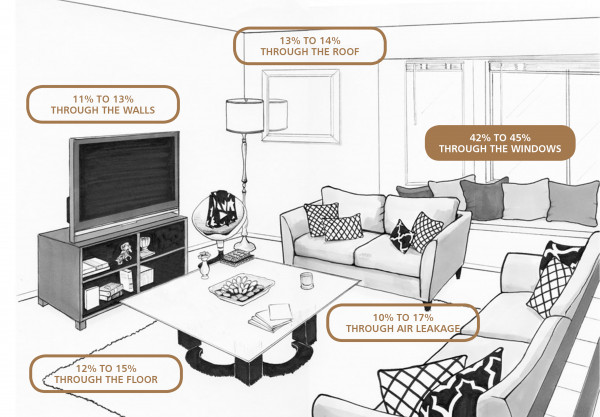
The good news is that curtains can significantly reduce heat loss through your windows, making your home easier and cheaper to heat and more comfortable and healthy to live in. In fact, EECA believe that well-fitting curtains and blinds, when closed, can reduce heat loss through single glazed windows by 60% and through double glazed windows by 40-50%. Consumer NZ have also agreed that insulating curtains and blinds can be just as effective, as double-glazing. By installing insulated curtains and blinds, you significantly reduce heat loss from your home and make the most of your investment in other energy efficient methods.
Even More Benefits
Investing in insulating curtains and blinds will not only save on heating costs, but will also bring a warm aesthetic value to your home. Fabric and colour introduce visual warmth and comfort that will automatically make your home look and feel more cosy. What’s more, insulating linings provide maximum light block out, reduce outside noise and make curtains look fabulous. They really are the ultimate choice in attractive, energy efficiency.
How Does Insulation Work?
When it is cold outside the windows panes in our homes become cool to touch, and the air close to these window panes will be cooled. Cool air is denser (heavier) than warm air, so as this cooled air sinks, it is replaced by warmer air from other parts of the room. This creates a circulating air current which will cool the entire room. Window furnishings are designed to trap the air between the window and the curtain or blind, to prevent this circulating air current from forming.
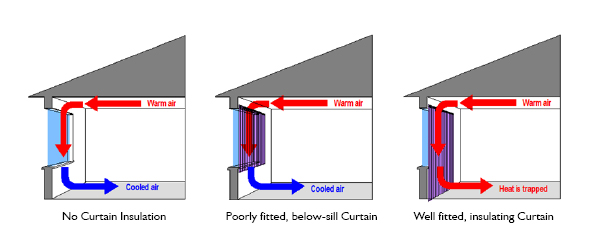
The Answer - Lewis's Insulating Curtains
Insulating curtains have been identified as one of the most effective ways of reducing heat loss through the windows. However, it is important to differentiate between what is a standard curtain and what is an insulated curtain. What gives a curtain its insulating properties is its insulating lining, and its well-fitting design.
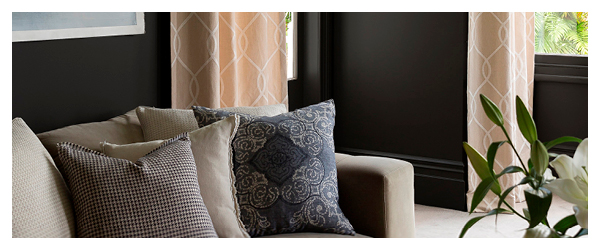
Insulating Linings
In the past thermal drapes, a single-layer fabric with an acrylic backing, have been the standard for insulated curtains. However, Lewis’s recommend Insulating Linings, which are sewn-in separate linings with a thermal coating. The thermal coating on the lining contains millions of very tiny air pockets, which are very effective at trapping air. In addition, by adding a separate sewn-in lining, the air is trapped in and between the different layers of materials.
Well-Fitting Curtains
A well-fitting curtain must be:
> Fitted as close as possible to the window frame
> Measured and fitted so that they touch the floor
> Be a generous width so that they overlap the window frames at the sides and the curtain returns back to the wall trapping the air between the window and the curtain.
Curtains that are designed to sit above the floor can actually make the situation worse by forming a channel between the window and the curtain, as shown above. Therefore, Lewis’s recommend curtains are designed to sit on the floor, to seal the gap and stop the air current escaping out the bottom of the curtain.
Kinetics Insulating Blinds
Lewis’s also partner with Kinetics to provide a range of attractive insulated blinds. Kinetics Cellular Blinds are very effective at trapping large amounts of air in their cellular structure. They are also available in block-out materials that have a reflective foil layer to reflect radiation. Kinetics Cellular Blinds in a block-out fabric have an R-Value of 0.5, offering more insulation than standard double glazing and ensuring your home remains warm and cosy throughout the cooler months.
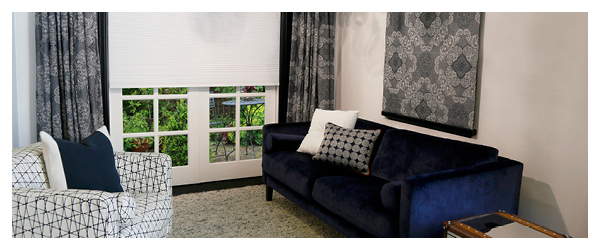
A Clear Comparison
Insulation is measured by an R-Value. The higher the R-Value, the better the product is at reducing heat flow and keeping heat in or out. According to Consumer NZ, under the new code, a brand new timber framed wall with no windows or doors has an R-Value of 1.99. In comparison, a standard 4mm glass window with an aluminium frame has an R-Value of only 0.15. However, a well-fitted, insulating curtain or blind can add an R-Value up to 0.5 to any window.

